February 26th, 2011 by PJSkerrett in Opinion, Research
No Comments »

 We all know that using a cell phone can stimulate the brain to work a bit harder. “Mr. Skerrett? This is Dr. LeWine’s office. Do you have a minute to talk about your test results?” or “Dad, a bunch of kids are going to Casey’s house after the dance. Can I go?” But a new study published in JAMA is making me wonder what the energy emitted by the phone itself — not just the information it delivers — is doing to my brain.
We all know that using a cell phone can stimulate the brain to work a bit harder. “Mr. Skerrett? This is Dr. LeWine’s office. Do you have a minute to talk about your test results?” or “Dad, a bunch of kids are going to Casey’s house after the dance. Can I go?” But a new study published in JAMA is making me wonder what the energy emitted by the phone itself — not just the information it delivers — is doing to my brain.
Here’s the study in a nutshell. Dr. Nora Volkow and her colleagues recruited 47 volunteers to have their brain activity measured twice by a PET scanner. Both times the volunteer had a cell phone strapped to each ear. During one measurement, both phones were turned off. During the other, one phone was turned on but muted so the volunteer didn’t know it was on; the other was left off. Each session lasted about an hour. The scans showed a small increase in the brain’s use of glucose (blood sugar) when the phone was on, but only in parts of the brain close to the antenna.
It was an elegant study. The researchers took pains to anticipate sources of error. They used a control (both phones off) against which to compare the effect of a “live” cell phone. They used cell phones on each ear, one on and one off, to see if the effect was localized. They muted the phone that was on to eliminate the possibility that any brain activation was due to listening to the sound of a voice coming through the phone’s speaker. So the result is probably a real one, not an artifact or measurement error.
What does this brain activation mean? No one really knows. As Dr. Volkow told NPR, “I cannot say if it is bad that they [cell phones] are increasing glucose metabolism, or if it could be good.” Read more »
*This blog post was originally published at Harvard Health Blog*
February 25th, 2011 by admin in Book Reviews, True Stories
No Comments »


This is a guest post by Dr. John Schumann.
**********
I just read the book “365 Thank Yous” by John Kralik. I heard an interview with the author on NPR and it caught my attention.
Kralik had been down on his luck in 2007: Divorced twice, overweight, with a struggling law firm that he’d started, he was also failing in a new romantic relationship. He was worried about losing his seven-year-old daughter, too, in a custody dispute.
He made a momentous decision: Instead of feeling sorry for himself (easy to do given his predicaments), he decided to be grateful for what he had. To show it, he vowed to write a thank-you note every day for the next year. What do you think happened?
His life changed for the better. His relationship improved. His clients started paying their bills and his firm’s financial footing solidified. His health improved. He eventually achieved his lifelong dream of becoming a judge. To top it off, he turned his personal quest into a writing project. Within minutes of writing a book proposal, he received responses from agents who hoped to shepherd his project. Every writer’s dream.
I’ll grant you that it sounds hokey. But there are a couple of things the book demonstrated to me. Read more »
*This blog post was originally published at ACP Internist*
February 23rd, 2011 by Davis Liu, M.D. in Health Policy, Opinion
2 Comments »

With the creation of consumer-driven health plans and health insurance policies with high deductibles linked to a savings option, more financial responsibility shouldered by patients and employees and less by employers was completely inevitable. The American public likes to have everything, whether consumer electronics or other services, as cheap as possible. With escalating healthcare expenses rising far more rapidly than wages or inflation, it’s not surprising employers needed a way to manage this increasingly-costly business expense.
In the past, companies faced a similar dilemma. It wasn’t about medical costs, but managing increasingly expensive retirement and pension plan obligations. Years ago, companies moved from these defined benefit plans to defined contribution plans like 401(k)s. After all, much like healthcare, the reasoning by many was that employees were best able to manage retirement planning because they would have far more financial incentive, responsibility, and self-motivation to make the right choices to ensure a successful outcome.
How did that assumption turn out anyway? Disastrous, according to a recent Wall Street Journal article entitled “Retiring Boomers Find 401(k) Plans Fall Short.” An excerpt:
The median household headed by a person aged 60 to 62 with a 401(k) account has less than one-quarter of what is needed in that account to maintain its standard of living in retirement, according to data compiled by the Federal Reserve and analyzed by the Center for Retirement Research at Boston College for The Wall Street Journal. Even counting Social Security and any pensions or other savings, most 401(k) participants appear to have insufficient savings. Data from other sources also show big gaps between savings and what people need, and the financial crisis has made things worse.
In others words, a lot of people don’t have enough money to retire. The options they have are simply “postponing retirement, moving to cheaper housing, buying less-expensive food, cutting back on travel, taking bigger risks with their investments, and making other sacrifices they never imagined…In general, people facing problems today got too little advice, or bad advice.” Read more »
*This blog post was originally published at Saving Money and Surviving the Healthcare Crisis*
February 23rd, 2011 by KevinMD in Health Policy, Opinion
No Comments »

There are plenty of reasons why medical students aren’t choosing primary care as careers. Lack of role models. Perception of professional dissatisfaction. High burnout rate among generalist doctors. Long, uncontrollable hours.
But what about salary? Until now, the wage disparity between primary care doctors and specialists has only been an assumed reason; the evidence was largely circumstantial. After all, the average medical school debt exceeds $160,000, so why not go into a specialty that pays several times more, with better hours?
Thanks to Robert Centor, there’s a study published in Medscape that shows how money affects career choice among medical students. Here’s what they found:
Sixty-six percent of students did not apply for a primary care residency. Of these, 30 percent would have applied for primary care if they had been given a median bonus of $27,500 before and after residency. Forty-one percent of students would have considered applying for primary care for a median military annual salary after residency of $175,000.
And in conclusion:
U.S. medical students, particularly those considering primary care but selecting controllable lifestyle specialties, are more likely to consider applying for a primary care specialty if provided a financial incentive.
Money matters. There should be no shame for new doctors to admit that. After all, they’re human too, and respond to financial incentives just like anyone else. And when most medical students graduate with mortgage-sized school loans, salary should be a factor when considering a career. Read more »
*This blog post was originally published at KevinMD.com*
February 23rd, 2011 by John Mandrola, M.D. in Better Health Network, Opinion
1 Comment »

 I am a doctor. Go ahead, call me what you may. Group me into a neatly, prejudged category: “All you doctors.” Just don’t label me a sponge.
I am a doctor. Go ahead, call me what you may. Group me into a neatly, prejudged category: “All you doctors.” Just don’t label me a sponge.
That’s right. Recently in the Wall Street Journal, Mr. Andy Kessler, famous author and former hedge fund manager smart enough to turn $100 million into $1 billion, grouped doctors into a sub-category of the service economy which he labeled as “sponges.” We could have done worse: His other categories included “sloppers” (DMV workers), “slimers” (financial planners), and “thieves” (cable companies).
It seems that doctors — along with cosmetologists, lawyers, and real estate brokers — offend him because of the tests and licenses that we deem necessary:
Sponges are those who earned their jobs by passing a test meant to limit supply. According to this newspaper, 23% of U.S. workers now need a state license. The Series 7 exam is required for stock brokers. Cosmetologists, real estate brokers, doctors and lawyers all need government certification. All this does is legally bar others from doing the same job, so existing workers can charge more and sponge off the rest of us.
His essay goes on to argue the tired notion that technology endangers jobs in the service sector — the toll booth operator argument, again. He likes the creators of stuff: Apple and Google. (Duh.) But in my mind, doctoring is about creating something: We create better and longer lives for our patients. Ask the patient cured of cancer how happy they are that some doctor created his or her treatment plan. Read more »
*This blog post was originally published at Dr John M*
 We all know that using a cell phone can stimulate the brain to work a bit harder. “Mr. Skerrett? This is Dr. LeWine’s office. Do you have a minute to talk about your test results?” or “Dad, a bunch of kids are going to Casey’s house after the dance. Can I go?” But a new study published in JAMA is making me wonder what the energy emitted by the phone itself — not just the information it delivers — is doing to my brain.
We all know that using a cell phone can stimulate the brain to work a bit harder. “Mr. Skerrett? This is Dr. LeWine’s office. Do you have a minute to talk about your test results?” or “Dad, a bunch of kids are going to Casey’s house after the dance. Can I go?” But a new study published in JAMA is making me wonder what the energy emitted by the phone itself — not just the information it delivers — is doing to my brain.

















